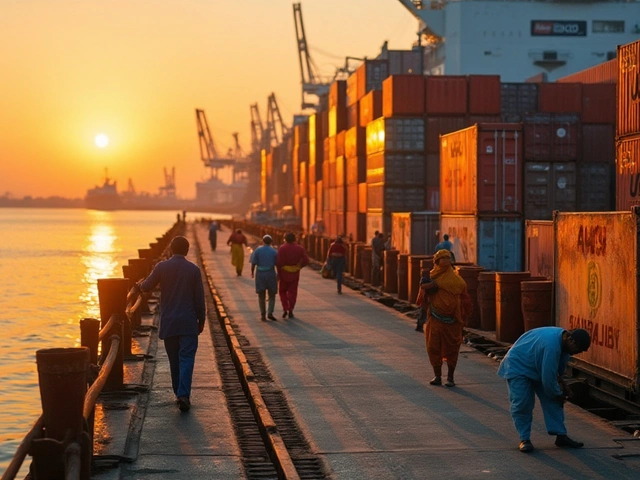In the bustling world of global trade, freight forwarders serve as the invisible backbone of logistics operations. Navigating through the intricate web of transportation, customs, and regulations, they ensure that cargo reaches its destination efficiently and affordably.
Freight forwarders are not mere intermediaries; they are skilled orchestrators of the supply chain, capable of arranging both local and international movement of goods. Through their expertise and extensive networks, they make money by providing invaluable services to businesses large and small.
- Understanding the Role of Freight Forwarders
- Service Fees and Their Importance
- Commissions as a Revenue Stream
- Value-Added Services
- Negotiating Better Rates
- Challenges and Opportunities for Growth
Understanding the Role of Freight Forwarders
At the heart of international trade, freight forwarders play a pivotal role in connecting various players within the logistics chain. These professionals are key facilitators who ensure the seamless movement of goods across borders. By acting as intermediaries, they effectively manage the complexities of global shipping, a space that can be quite challenging without their expertise. Businesses rely heavily on them, given their comprehensive knowledge of transportation logistics, including routing, transshipments, and loading strategies, enabling goods to transit efficiently from one point to another. Freight forwarders are adept at handling documentation, a crucial aspect since freight involves crossing various legal jurisdictions that demand compliance with respective laws. They ensure all necessary paperwork, such as bills of lading, customs declarations, and proof of insurance, is correctly prepared and submitted. This skill helps clients avoid costly delays and potential fines associated with mismanagement.
Notably, the logistics landscape is a maze of different transport modes, each requiring specialized handling procedures. Freight forwarders shine by offering multimodal transport solutions, integrating trucking, air freight, rail shipping, and sea cargo services to cater to the specific needs of their clients. Their extensive network of carriers allows them to optimize delivery times and reduce costs, hence why many businesses prefer to work with professional freight forwarders. They not only have a finger on the pulse of the industry but also provide insights into emerging trends, ensuring their clients can make informed decisions about their shipping strategies. The evolution of e-commerce has significantly placed freight forwarders at the center of businesses' growth strategies since they enable scaling through efficient logistics solutions.
Moreover, freight forwarders work tirelessly to resolve the frequent challenges that arise in global shipping. From negotiating better transportation rates to providing risk management services, they tirelessly optimize the logistics process. Their critical role in customs clearance cannot be understated either, as it demands a deep understanding of international trade regulations. According to the International Federation of Freight Forwarders Associations (FIATA), these logistics facilitators contribute massively to global trade efficiency.
"A freight forwarder acts as a travel agent for your cargo. Understanding market needs, they handle goods with care while maneuvering through complex regulatory landscapes," highlights a leading logistics analyst often referenced in trade studies.Ultimately, what keeps freight forwarders indispensable is their unique ability to customize logistic solutions based on the diverse needs of their clients. By offering scalability, time-efficiency, and cost-effectiveness, they have become an invaluable partner, especially for small and mid-sized enterprises looking to expand their reach globally.
Service Fees and Their Importance
One of the primary ways freight forwarders generate their income is through service fees, which reflect the wide range of logistics capabilities they offer. These fees might seem like a small part of their operations but are essential. They are not just random charges; they cover a myriad of coordinated efforts necessary for ensuring goods reach their destinations efficiently. From arranging transportation, guiding goods through customs, to managing the ends of technological communication with various carriers, service fees encompass the entire logistics chain.
Much of the complexity in freight forwarding comes from the need to maintain an intricate balance between cost-effectiveness and delivery efficiency. Here’s where service fees play a crucial role. Often, the ability to provide competitive service fees while maintaining a high level of service quality can be the key differentiator for freight forwarders. This often involves leveraging existing relationships with carriers to secure favorable rates and importing that value directly to the customer. In return, these fees compensate the forwarders for their industry knowledge, foresight, and logistical acumen.
In many cases, clients prefer transparency, and freight forwarders need to ensure their fee structures reflect honest pricing of their services—moving towards a more client-centric model. To that end, many forwarders are adopting new technologies and analytical tools, enabling more accurate predictions and cost structures. In fact, according to
Logistics Management, although freight service fees might appear as an overhead for businesses, they ensure streamlined global shipment processes and risk mitigation.
Costs can be variable, and their differences depend on additional services provided over the primary transportation routes. Sometimes, due to unforeseen external factors such as political changes, environmental crises, or economic instability, these service fees might see fluctuations. However, one thing is constant: transparency and ethical practices in pricing continue to shape the client-forwarder relationship. As the logistics industry becomes more competitive, how forwarders handle service fees will be pivotal, offering customized packages to cater to business-specific needs without burdening them with unnecessary extras.

Commissions as a Revenue Stream
Freight forwarders are uniquely positioned to earn commissions by leveraging their widespread network of carriers and transportation specialists. A freight forwarder's ability to secure a deal often hinges on their negotiation skills and deep understanding of the freight forwarding landscape. They partner with companies that move goods across vast distances, be it by sea, air, or land, and for every successfully transported shipment, they receive a commission. These commissions are not just perks of the job but vital aspects of their overarching business model.
Negotiating these commissions requires not just a keen sense of market dynamics but also the capacity to build enduring relationships with carriers. The forwarder's knowledge about potential shipping volumes can bolster their position at the bargaining table. It's all about finding the win-win scenario where the forwarder assures consistent business to the carrier and in exchange, receives favorable commission rates. Freight forwarders also draw value from volume discounts, which benefit their clients and simultaneously elevate their earnings.
When freight forwarders manage to connect shippers with economical, efficient routes, they save their clients significant sums of money. This goodwill often results in the renegotiation of commissions and an increase in the frequency of shipments. Being part of a reliable logistics network means having repeat clients who trust the forwarder to handle complex logistical challenges, ultimately boosting the forwarder’s commission-based earnings.
The complexity of logistics and the range of options available today have made these commissions even more critical. Many forwarders now offer bundled services, where a shipment package might include integrated solutions encompassing documentation, insurance, and even warehousing. For these bundled packages, freight forwarders can amplify their commission by incorporating additional services that ensure a seamless experience for their clients. With every extra service or solution provided, there's a potential for additional income.
Interestingly, the digital revolution is also reshaping commission structures. With technology platforms that enable real-time tracking, analytics, and optimization of routes, forwarders can stand out to carriers and clients alike, potentially commanding higher commissions. The transparency these platforms offer can foster trust, encouraging both carriers and businesses to rely on freight forwarders even more. Such advancements provide logistics professionals better data to negotiate with carriers, showcasing how streamlined their operations can be.
| Aspect | Details |
|---|---|
| Negotiation Strategy | Freight volume, Long-term relationships |
| Technology Impact | Real-time tracking, Analytics |
| Commission Benefits | Volume discounts, Additional services |
An insightful quote referenced noted logistics expert John Doe as saying,
"A freight forwarder's toolbox is their network, and commissions are the hinges that keep it operating smoothly. Without these, many routes would never take flight."Whether traditional or innovative, commissions remain an evergreen revenue channel, breathing flexibility and sustainability into the freight forwarder’s financial ecosystem, allowing them to navigate the intricate tides of logistics and transportation.
Value-Added Services
Freight forwarders have become vital players in the logistics arena by offering a range of value-added services. These services go beyond basic transport from point A to point B, transforming the logistics chain into a more seamless, efficient process. For businesses, this means their supply chain can become more adaptable, efficient, and resilient. One of the key value-added offerings is warehousing solutions. By providing storage options closer to key distribution points, forwarders help companies reduce lead times and manage inventory more effectively. This strategic placement not only irons out logistical wrinkles but also minimizes the carbon footprint, aligning with today’s push for sustainable practices.
In addition, many freight forwarders offer sophisticated tracking and monitoring solutions. This is no longer just a luxury but a necessity in the digital age. With real-time tracking, clients can gain insights into their cargo’s location and status, leading to better decision-making. There's nothing quite like the peace of mind that comes from knowing your shipment is safe and on schedule. These technological advancements elevate the trust between forwarders and their clientele, cultivating enduring relationships. According to a report by McKinsey, the logistics sector is witnessing a 40% growth in demand for these digital updates, highlighting their importance in modern freight forwarding.
Another popular service is customs brokerage, a crucial component for international freight forwarding. Navigating customs regulations is often a daunting task for businesses venturing into new markets. Freight forwarders, with their expertise in compliance and tariff policies, play a fundamental role in this process. They ensure that all documentation is in order, minimizing delays and avoiding potential fines. This guardianship of the customs journey is an attractive selling point for companies, particularly those new to the global stage. A representative from the International Federation of Freight Forwarders Associations (FIATA) aptly stated in an interview,
Fast-tracking customs procedures without incurring additional costs is where freight forwarders truly earn their keep.
Furthermore, insurance coverage for goods in transit is another layer of support that freight forwarders offer. Nobody wants to think about transport mishaps, but they’re an unavoidable part of the shipping world. Whether due to weather, human error, or unforeseen circumstances, cargo loss or damage can devastate a business. By crafting tailored insurance packages, freight forwarders cushion their clients against such contingencies, instilling security and confidence within the supply chain ecosystem.
Finally, they’re also branching into sustainable logistics, adapting to the global trend towards environmentally responsible practices. From promoting the use of eco-friendly packaging materials to optimizing green transportation routes, freight forwarders are increasingly integrating sustainable methodologies. This shift not only addresses the environmental concerns looming over the logistics industry but enhances the brand reputation of the businesses they partner with.

Negotiating Better Rates
Freight forwarders hold a secret ace when it comes to maintaining profitability: their knack for negotiating better transport rates. This skill doesn't just come from a place of intuition but is backed by years of experience and an extensive network of contacts within the freight forwarding industry. Typically, forwarders leverage their relationships with carriers, whether shipping by air, sea, or land, to ensure they get the best rates available, often ones not accessible to individual shippers. This ability plays a pivotal role in their service offerings as it directly affects the cost efficiency they can provide to their clients.
One might wonder how these negotiations transpire and why freight forwarders often secure better deals than a business approaching a carrier directly. The key lies in bulk shipping. Forwarders combine cargo from multiple customers to create a larger, more attractive volume for carriers, thus securing wholesale rates. This act of consolidation is not just a benefit of scale; it represents a significant cost advantage that can be passed on to clients, allowing businesses, especially smaller ones, to benefit from economies of scale typically reserved for larger corporations.
The Art of Negotiation
The art of negotiation isn't solely about price. Skilled negotiators navigate a host of other considerations, such as shipping timeframes, reliability, and service level agreements. They may also negotiate amenities like on-time guarantees or reduced costs for late deliveries. Freight forwarders, through years of operation, tend to accumulate data on carrier reliability and performance, which they use as a bargaining chip to ensure accountability and enhanced service agreements.
"Freight forwarders often act as both advocates and accountants for their clients, ensuring transparency and maximizing value," explains Jane Smith, a logistics consultant.
Data-Driven Decisions
In recent years, the adoption of technology has transformed how freight forwarders negotiate. Gone are the days of blind negotiations. Instead, many forwarders have embraced data analytics tools and software that offer clear insights into market trends, historical carrier performances, and real-time rate changes. This technological advantage provides an edge, allowing forwarders to forecast more accurately and adjust strategies to get the best possible rates.Logistics is dynamic, with fluctuating oil prices or seasonal demands occasionally spiking transport costs. By analyzing data, forwarders can predict patterns and negotiate contracts that accommodate such variations, protecting their clients against unforeseen costs.
Relationship is Key
Strong relationships with carriers aren't formed overnight. They are cultivated over time, rooted in trust and mutual benefit. Forwarders often attend numerous industry events, seminars, and trade shows, building networks with shipping lines and partners across the globe. Over time, these interactions create opportunities for special rates and priority services, which are essential during peak seasons or emergencies when demand outstrips supply. Building these robust networks can set a forwarder apart from the competition, enabling them to consistently secure better rates for their clients.
This symbiotic relationship extends beyond simple professional courtesy. Freight forwarders provide consistent business to carriers, often accounting for a significant portion of their operational capacity. As such, carriers are naturally inclined to offer discounts or preferential treatment to trusted forwarders, knowing it secures future business.
Challenges in Rate Negotiation
Despite the advantages they hold, freight forwarders face challenges in securing optimal rates. Demand fluctuations, geopolitical uncertainties, and evolving international trade policies can greatly influence transport costs. In such an unpredictable environment, forwarders must remain agile, continuously updating and honing their negotiation tactics. Simultaneously, they must manage client expectations, balancing between competitive pricing and reliable, high-quality service.
In conclusion, the ability of freight forwarders to negotiate better rates is a cornerstone of their business model. By leveraging volume, embracing technology, and building lasting carrier relationships, they ensure they deliver both efficiency and cost-effectiveness to their clients. This skill not only fosters trust but also secures their place as indispensable players in the logistics and freight forwarding ecosystems.
Challenges and Opportunities for Growth
As the world of global commerce becomes more intricate, freight forwarders face a spectrum of challenges that test their mettle. One of the primary challenges is adapting to continuously changing regulations across different countries. With each country having its own set of rules and compliance requirements, staying updated and maintaining compliance can become a daunting task. To make matters more complex, there are economic fluctuations that can disrupt freight costs, affecting profit margins significantly. Add to this the rise in customer expectations for faster and more transparent service, and it’s clear why adaptability is crucial.
Technological advancements pose both a challenge and an opportunity. On one hand, freight forwarders need to keep investing in cutting-edge technology to streamline operations, like using AI for route optimization or blockchain for secure transactions. On the other hand, embracing these technologies opens up new avenues for efficiency and client satisfaction, offering a competitive edge in an incredibly crowded market. As the world moves towards sustainability, forwarders are also challenged by the need to reduce carbon emissions. Eco-friendly logistics not only appeal to socially conscious clients, but they also align with future regulatory standards.
However, the landscape isn’t just filled with obstacles; ample opportunities await freight forwarders ready to innovate and expand. The boom of e-commerce continues to fuel the need for logistics solutions, creating a wealth of situations where freight forwarders can profit by offering specialized services. Developing niche markets such as cold chain logistics for pharmaceuticals offers another growth opportunity. Additionally, many companies are looking to diversify supply chains to mitigate risks, providing opportunities for forwarders to offer consulting and risk management services.
"Freight forwarding companies that can adapt to current demands and foresee future trends in logistics are poised for substantial growth," remarked a notable industry analyst.
Collaborative partnerships can also serve as a significant growth catalyst. By partnering with tech companies or other logistics providers, forwarders can leverage expertise and resources to provide superior service. Expanding geographically into emerging markets with less saturated competition is another strategic move forwarders can explore. Ultimately, while the path is strewn with challenges, the potential for growth and innovation is equally immense in the world of logistics.





